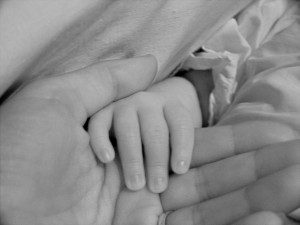Submitted by: Suzanne Swanson, PhD, LP
Introduction from Debra: We have reached a time in the developed world that it is not enough to survive childbirth, women must survive and thrive physically and emotionally. To ignore the importance of a women’s emotional well-being during childbirth is to leave a mark that can create a lifetime of pain. As Dr. Sarah Buckley says” When women are safe, supported and undisturbed” they can find comfort and pleasure in birth and I would add thrive emotionally. ~ Debra Pascali-Bonaro
 Sara doesn’t like to tell her birth story: “I didn’t have a Cesarean. My baby came fast, really fast. People say I’m so lucky I didn’t have a long labor. I’m ok; my baby is healthy. But I felt so alone: no one believed me, no one was ready to help me.”
Sara doesn’t like to tell her birth story: “I didn’t have a Cesarean. My baby came fast, really fast. People say I’m so lucky I didn’t have a long labor. I’m ok; my baby is healthy. But I felt so alone: no one believed me, no one was ready to help me.”
LaKeesha’s story looks very different, but she’s pretty reluctant to talk about her baby’s birth, too: “I did have a Cesarean. My baby came early and then they had to get her out immediately. But then even when her Apgars were good, they kept her in the NICU. I had to fight to give her my colostrum and breastfeed her. She’s thriving and happy now. My friends keep telling me to focus on the present. Why can’t I stop thinking about what might have happened?”
Cheryl Beck’s research leads her to conclude “birth trauma is in the eye of the beholder.” Sarah and LaKeesha both experienced birth trauma: each one lost her sense of feeling basically safe — emotionally or physically or both — in the world. The births of their children activated a sense of danger, plus the physiological arousal that comes with “fight or flight.” And neither the fear nor the arousal seem to go away.
Sara doesn’t want to go to her 6 week appointment. She’s not sure her 3rd degree tear is healing properly, but she doesn’t really trust her OB to take her seriously anymore. She finds herself thinking, “I’m not really worth listening to.” LaKeesha isn’t sleeping well. She wakes in a panic from nightmares — the baby’s heart rate is dropping! During the day she flashes back again and again to her separation from her baby, her longing to hold her and breastfeed her. She feels like a bad mom “Why didn’t I insist they bring her to me sooner?”
They’re not alone. Eighteen percent of women in the 2008 New Mothers Speak Out survey experienced some of the characteristics of post-traumatic stress syndrome (PTSD): flashbacks of the birth, nightmares, difficulty sleeping or concentrating, anxiety or panic, anger or irritability, numbness or avoidance. Nine percent of the mothers surveyed met all the criteria for PTSD. (Childbirth Connection, 2008)
We women can feel so vulnerable giving birth. We’re in a new world with each birth, an unfamiliar land with no guideposts. With care, respect, and encouragement, a woman’s openness to this unique birth can be transforming and her own confidence can blossom.
But when things happen quickly, when no explanations are given (or laid out without room for informed consent), when a woman does not feel respected, when a physical sensation reminds her of previous sexual trauma, she can feel overwhelmed and unable to integrate her emotional experience. “What’s happening to me? Is my baby ok?” In the middle of feeling threatened, often a woman tries to protect her baby: “Do whatever you need to!” Or she may feel guilty later that she was unable to give her baby the start she’d hoped for.
And we must not forget partners. Ed’s wife Karen gave birth to their baby boy in the water. They felt so connected as a family, so happy with the support of their midwife and doula. Then — hospital policy — the baby’s glucose levels were tested and found to be borderline and he was taken to the special care nursery. Karen was tired and in tears. Ed wanted to advocate for their family, but he was tired, too, and felt helpless. He just couldn’t figure out what to ask, what to say. Weeks later, he goes over and over the conversations with the RNs and the pediatrician. He doubts himself as a father and is not as involved with his son as he imagined he’d be.
How can we work with birth trauma? What do these parents need? They need, first of all, to be heard and respected. If we respond to their stories with “but you have a healthy baby; that’s what’s important,” we dismiss them one more time. Minimizing re-activates that sense of emotional danger (“I don’t matter”) and invalidation. We need to provide the safety of acceptance to parents whose births (and that includes the postpartum period) have been traumatic — the safety of witness, of being validated and cared for. We ask open-ended questions (“what was that like for you?” and “what had you hoped for?”). We make open-ended comments: “There’s so much you’re turning over.” “What you wanted matters.” We don’t superimpose our own beliefs or experiences on theirs.
 We listen some more. We may, as we get to know the story, notice with them that there are some parts of the story that are not activating, parts of the birth that actually felt — and still feel — safe and satisfying. We don’t use that knowledge to dismiss the sense of danger. We simply notice that — for some parents, not all — the story is a little larger, a little wider, a both/and (safety/danger), not only a story of panic and trauma. We can sit together with grief and sorrow and loss.
We listen some more. We may, as we get to know the story, notice with them that there are some parts of the story that are not activating, parts of the birth that actually felt — and still feel — safe and satisfying. We don’t use that knowledge to dismiss the sense of danger. We simply notice that — for some parents, not all — the story is a little larger, a little wider, a both/and (safety/danger), not only a story of panic and trauma. We can sit together with grief and sorrow and loss.
We can offer traumatized parents simple techniques to ease their anxiety and panic: meditation, relaxation, 4/7/8 breathing or butterfly tapping to lower their baseline level of arousal. We can encourage them to develop a postpartum mantra that includes both the distressing experience and affirmation. For example, Sarah might repeat, “Even though I felt like nobody was listening to me, I deeply and completely accept myself, and I believe I am worth listening to.”
What else? We can point out resources online to share experiences or learn more about trauma:
- Solace for Mothers http://www.solaceformothers.org
- Prevention and Treatment of Traumatic Childbirth http://pattch.org
- International Cesarean Awareness Network http://ican-online.net/
- The Birth Trauma AssociationTrauma and Birth Stress (TABS) http://www.tabs.org.nz/
- PTSD after Childbirth http://ptsdafterchildbirth.
blogspot.com/ - Postpartum Support International www.postpartum.net
- Postpartum Progress www.postpartumprogress.com
We can suggest classes, workshops and groups that focus on healing birth (see see FB pages for ICAN, Healing Birth Stories, Another Birth/Another Story).
We can encourage parents to consult psychotherapists, bodyworkers and postpartum doulas (and birth doulas during another pregnancy) who are familiar with both physiologic birth and birth trauma.
Women and their partners do heal from difficult or traumatic birth. We can help them reclaim their confidence, strengths and connection to each other.
* * *
Beck C. 2004. Post-traumatic stress disorder due to childbirth: the aftermath. Nursing Research 53(4): 216-24.
Declercq E, Sakala C, Corry M, Applebaum S. 2008. New Mothers Speak Out: National Survey Results Highlight Women’s Postpartum Experiences. Childbirth Connection: New York
 Suzanne Swanson, PhD, LP is a psychotherapist who has been working with pregnancy, labor, postpartum, loss and mothering for over 30 years. She was Founding Director of Pregnancy and Postpartum Support Minnesota; she is a Minnesota Coordinator for Postpartum Support International and a board member of PATTCh (Prevention and Treatment of Trauma in Childbirth). Suzanne is the author of What Other Worlds: Postpartum Poems. She is mother to three adult children, and grandmother to one sweet baby.
Suzanne Swanson, PhD, LP is a psychotherapist who has been working with pregnancy, labor, postpartum, loss and mothering for over 30 years. She was Founding Director of Pregnancy and Postpartum Support Minnesota; she is a Minnesota Coordinator for Postpartum Support International and a board member of PATTCh (Prevention and Treatment of Trauma in Childbirth). Suzanne is the author of What Other Worlds: Postpartum Poems. She is mother to three adult children, and grandmother to one sweet baby.
Thank you, Suzanne, for that excellent article. I’m printing it to use as a handout with my clients who have had a traumatic birth. I also appreciate your mention of PATTCh (Prevention and Treatment of Traumatic Childbirth), and invite readers to visit our website: PATTCh.org (note the 2 T’s in PATTCh.
Penny